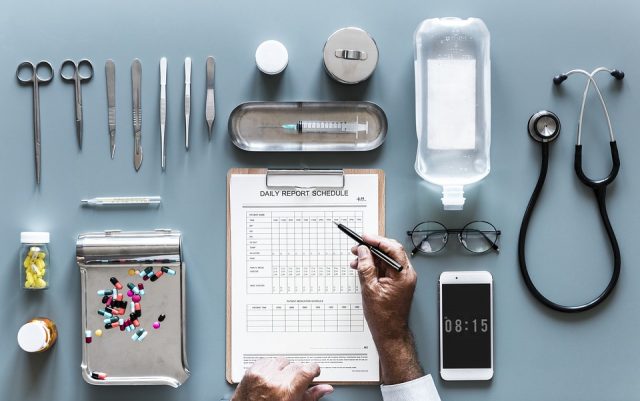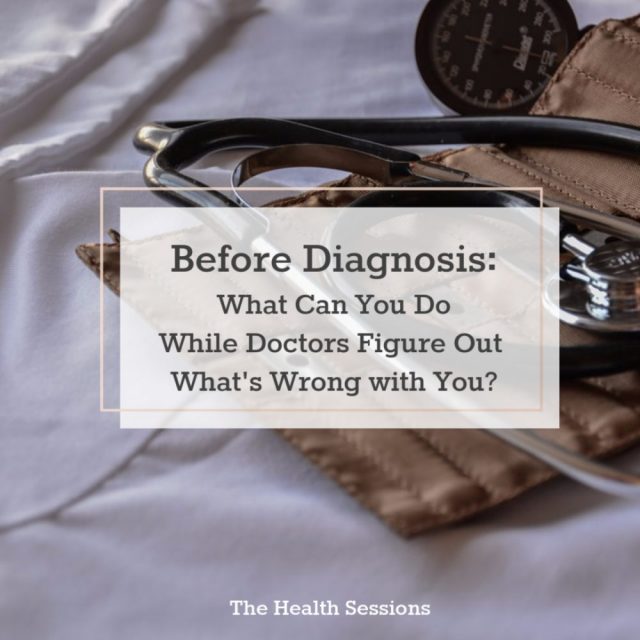How Obsessive Compulsive Disorder Can Threaten One’s Job

This blog post contains affiliate links to resources you might find helpful, at no extra cost to you. All opinions are my own.
When you’re generally healthy and you become sick, you expect to go to the doctor’s, get a physical examination and then go home with a diagnosis and a prescription. But things aren’t always that clear-cut.
Sometimes symptoms can be vague, fitting many different diagnostic criteria. Or maybe your test results come back inconclusive, or not even show that something is wrong at all – while you’re obviously not doing fine.
But getting the right diagnosis is often the first step towards finding a cure or managing your symptoms. In the meantime, how do you handle being sick? What can you do to deal with the pain, fatigue, anxiety, stress and practical problems?
Before diagnosis, is there anything helpful you can do while doctors figure out what’s wrong with you?
Of course being educated about your health is a good thing. But it’s best to leave the diagnosing up to your doctor instead of Google. There’s a reason why physicians spend years and years in med school: figuring out what’s wrong with someone requires more than ticking off a list of symptoms. What’s more, not all the medical information online is reliable, nor applicable for your specific situation. Make sure you remember that the next time you start googling your symptoms in the middle of the night.
One way to get more insight into vague, hard-to-diagnose signs of illness is to use health trackers to log your symptoms, sleep patterns and medication intake. Keeping track of your health can make it easier to communicate how you feel to your doctors. It could also reveal characteristic patterns or correlations between triggers and the onset of symptoms.
Tracking your health may not be helpful when you tend to become hyper-focused on your bodily sensations. That kind of health-related anxiety will only make you feel worse.

Easier said than done, I know, but don’t let your imagination run wild about what could be wrong with you. Being stressed out only aggravates your health condition, so find ways to keep your anxiety and worrying under control. You could distract yourself with an inspiring book and feel-good movie or calm your mind with deep belly breathing, mediation or yoga.
Also avoid catastrophizing and other cognitive errors. We’re all guilty of having inaccurate thoughts, but when you’re sick, expecting the absolute worst to happen or magnifying the negative aspects of your situation doesn’t do anyone any good. What’s more, rumination – going over and over problems in your mind – is one of the biggest predictors of mental health problems.
Instead of worrying, try to get out of your head. Hands-on work like gardening, and moving your body both significantly lower your stress levels and improve your overall wellbeing.
If you don’t know what’s wrong, how can you start fixing your health? While you’re waiting for a diagnosis and treatment, there are some things you can do to support your body’s natural recovery.
Two things contribute to a whole range of health problems: stress and chronic inflammation. From digestive issues to migraine and joint pain, more and more research suggests that inflammation in your body may be an underlying cause of many diseases. Stress also wreaks havoc on our mind and body, which in turn is linked to a disturbed inflammatory response and lots of stress-related health problems.
With that in mind, is there anything you can do to reduce the possible impact of these common contributors on your health?

Whatever the specific cause of your symptoms, getting a good night’s sleep is the foundation of your physical and mental health. Your body needs plenty of refreshing sleep in order to recharge, recover and rebuild.
Unfortunately, when you need it the most, getting 7 to 8 hours of shut-eye may be harder than ever before. Pain, scary symptoms and worries can keep you up at night. If you suffer from health-related insomnia, make sure you got the basic rules of good sleep hygiene covered. Avoid caffeine after lunch (that includes chocolate!), keep your bedroom dark and cool, and consistently go to bed and wake up at the same time.
Next, you could try more unconventional tips to catch plenty of zzz’s: designate a cut-off time for stimulating activities (including staring at blue-lit screens), identify the best time to take your meds and supplements, and condition your body for sleep with a relaxing bedtime ritual.
If you still find yourself wide awake at night, focus on recharging your body in different ways. There’s a difference between lying in bed scrolling through social media and real rest. Real rest involves activating your body’s natural relaxation response, which is a state of deep rest that balances your nervous system and promotes healing. You can produce this relaxation response with any activity that slows down your breathing, releases tension from your muscles and calms your mind. For example, you could relax your body from head to toe with a mindful body scan, do a loving-kindness meditation or practice yoga. Even a simple breathing exercise or calming visualization can help you get into a more restorative state.
So make sure you make sleep and real rest a priority while doctors figure out what’s wrong with you.

You know that prolonged stress can trigger or worsen all kinds of health problems. But avoiding or reducing stress is easier said than done, especially when illness turns your whole world upside down.
Stress has both physical and emotional components. Maybe you’ve been pushing your body too far, trying to tackle endless to-do lists on an empty tank. In that case, it would be wise to learn how to pace yourself. No matter the diagnosis, your health will benefit from alternating activities with restorative breaks and paying attention to your body’s warning signs.
If you’re emotionally stressed out and overwhelmed, the best strategy would be to find ways to both reduce those feelings when they pop up and create a plan to prevent (the impact of) stressful situations. When you notice you’re getting tense, first take a deep breath. Distract yourself with your favourite series, seek support from friends and family or go for a walk in nature to calm yourself. When you feel more relaxed, take action to cope better with your stressful situation in the long run. Identify recurring triggers and anticipate, create energy-conserving routines and purposely cultivate more positive emotions.
Both awaiting and getting a diagnosis can be a stressful time, so experiment what helps you cope in a healthy way.
As mentioned, chronic inflammation plays a role in many health problems. Although you should wait for your test results to show if you suffer from inflammation as well, there are some simple things you can do to reduce potential inflammation.
One major contributor to inflammation is your diet. A food pattern high in sugar, trans fats, processed meats and alcoholic drinks drives inflammation that can lead to disease. Even though I do not recommend overhauling your entire diet without your doctor’s approval, you could make a few easy changes that’ll improve your overall health.
Minimize your consumption of foods that trigger inflammatory reactions by cutting down on sugar and processed foods. Instead, load up on vegetables, fruit, (gluten-free) whole grains and fatty fish. Swap your coffee and wine for mocktails and health-boosting hot drinks. What’s more, spices like ginger and turmeric are known for their anti-inflammatory powers, so experiment with ways to add them to your meals.

When you don’t have a diagnosis, you often also lack the right medication to treat or manage your symptoms. What can you do in the meantime?
First off, never start experimenting with (over-the-counter) drugs, extreme diet changes or other invasive treatments without consulting your treating physician. Unwillingly, you may do more harm than good or even put yourself in danger. Having said that, there are gentle ways to ease your symptoms. For example, when you’re in pain, you could use a heatable cherry pit pillow or a self-massage tool to soothe tense muscles. You can also try breathing exercises and mental techniques to cope better with the pain. Or if you suffer from nausea, you could try proven home remedies like ginger tea and peppermint aromatherapy to reduce your symptoms.
You shouldn’t have to be in constant agony until you receive a diagnosis.
If your symptoms persist and there’s no diagnosis – and hence no treatment – in sight, you may need to start thinking about how you will handle work and family obligations in the meanwhile. Because when you feel sick, your normal life probably comes to a halt. Instead, you spend a lot more time in bed and at doctor’s appointments.
So even when you don’t know what’s wrong with you yet, it can be helpful to rally your support systems and make a plan on how you’ll tackle practical problems. Who’s going to walk the dog, take the kids to school and clean the house when you no longer can do it? How will you handle the impact of taking time from work, advocating for your health and doing the admin work for the insurance company? Try to simplify your life and routines so you can use that time and energy to work on your health and quality of life.
For more problem-solving ideas, take a look at The Ultimate Guide for Getting Things Done with Chronic Illness.
How do you cope physically, emotionally and practically during the weeks or months before diagnosis?
For more information on how you can support your healing process after you’ve received a diagnosis, check out ‘How to Create Your Own Action Plan for Recovery’. No miracle cures, but actionable advice to start rebuilding your health today.
If you enjoyed reading this article, you might also like: